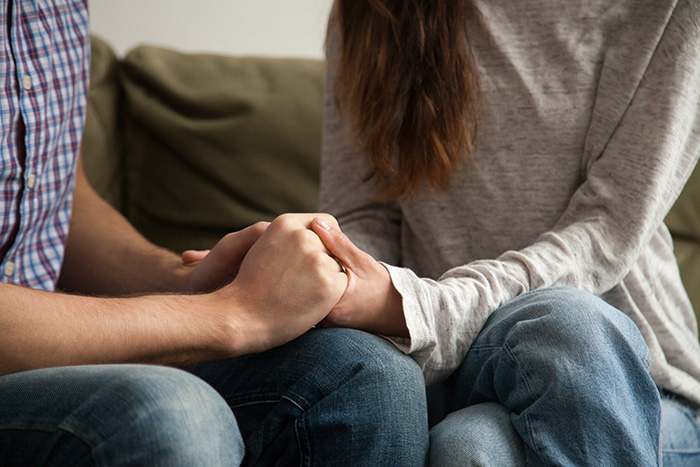When you have a partner with an eating disorder, it can put a lot of strain on your relationship. You might accidentally trigger your spouse with offhand comments about the things you ate for lunch or how a celebrity looks in a magazine. You might blame yourself.
But the best way to support a partner with an eating disorder is to understand that you are equally as powerful in helping them recover, being a source of encouragement and empowerment for them.
How to Support a Partner with an Eating Disorder
Educate Yourself
If you have a partner with an eating disorder, the first thing you want to do in order to support them is to educate yourself.
If you know the specific type of disorder your partner has, look for information about that disorder starting with the DSM and ending with things like support groups for family members of those with eating disorders.
If you don’t know the specific disorder they have, that’s okay. Look for information like books and podcasts that are freely available online about eating disorders in general. This will give you some of the basic information you need to better understand your partner and support them.
Don’t Comment
Eating disorders not only come with a physical component but with a psychological component. If you have a spouse or partner with an eating disorder, you will have to make an effort to avoid commenting on appearance, theirs, yours, that of strangers or even celebrities.
What might seem to you to be offhand comments can be triggering for your partner and perpetuate unrealistic ideas or obsessive thoughts about appearance. Instead, talk about personality traits, accomplishments, or strengths.
Don’t Control
Try as you might, you cannot control a spouse who has an eating disorder.
You can’t control their eating habits.
You can’t control their recovery.
You can help though, by providing encouragement and empowering your partner by doing things for yourself and for the family that you leave open to them.
For example, if you do food prep, you might let them know that there are plenty of meals available for them but you might also recognize that they may or may not take the meals and even if they do, they may or may not eat them but the opportunity and the empowerment is there.
Let them know, when they take positive steps to improve their well-being and their eating habits, that you are proud of them. Don’t monitor their behavior or try and force them to eat as this will just breed mistrust in secrecy.
Ask
One of the easiest ways to learn how to support a partner with an eating disorder, instead of controlling their eating behaviors, is to ask them what they need from you.
Don’t ask every day but check in now and again to see if their answers have changed and what type of help they might need or prefer.
Avoid Judgment
Whether your spouse is in recovery or still struggling with an eating disorder they will slip up and it’s important that you don’t add to the shame and guilt they already feel. Don’t blame them, don’t make comments, but rather, be a non-judgmental partner that they can turn to for help.
The less judgment they feel from you, the more likely they are to come to you for help or to express themselves.
Be a Model of Healthy Eating
In order to support a partner with an eating disorder, you need to be a model yourself for positive body relationships and healthy eating practices. This means practicing things like:
- Being in tune with hunger
- Not criticizing yourself for your food or making comments about appearance
- Not commenting on what a spouse eats
- Encouraging healthy portions and meals with things like food prep
These steps are simple ways you can learn how to support a partner with an eating disorder and support yourself in mindful eating.
Encourage Them to Get Help
Where necessary, the best way to support your partner with an eating disorder might be to encourage them to get help from a professional treatment center.
At Casa Serena Treatment Programs For Women, we provide women’s only treatment, minutes from the beach with a full range of care including several eating disorder programs specifically for women. Our women’s eating disorder program incorporates several types of therapies designed to help clients gain insight into any underlying trauma and the way that trauma impacts their behaviors, and to learn to love themselves for who they are, as they are.
It is important to remember that Eating Disorders are considered very serious mental health conditions and getting formal treatment is not a magic cure but it will provide things like emotional regulation skills and coping strategies that your loved one can use. Change won’t be instantaneous but it can be lasting.
Get treatment for women, by women today by calling: (866) 936-9740.



